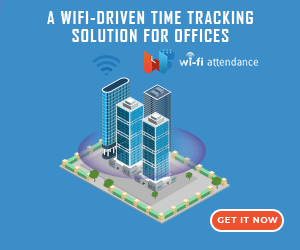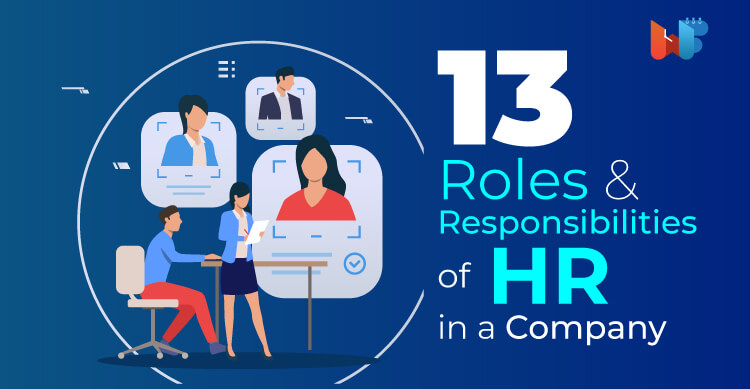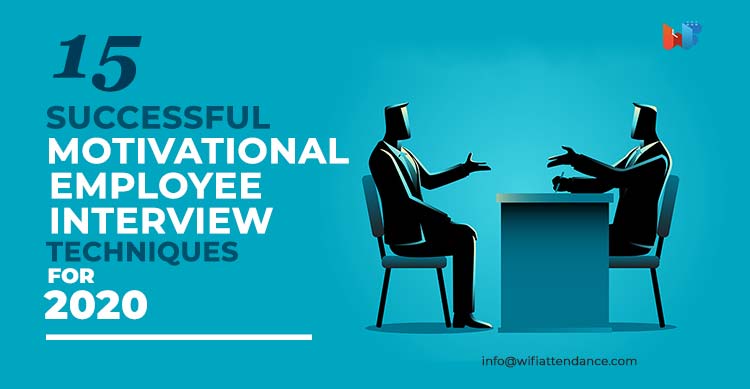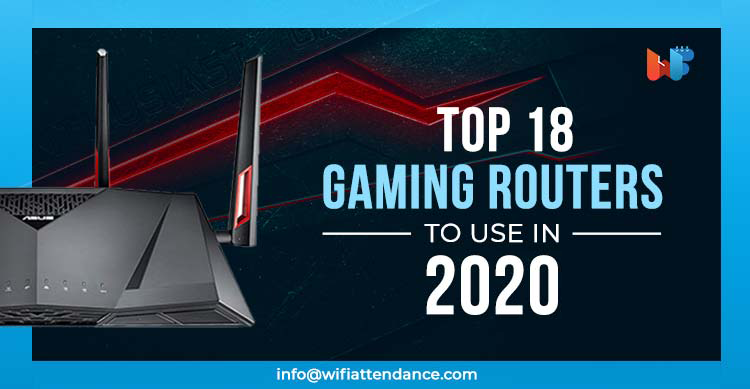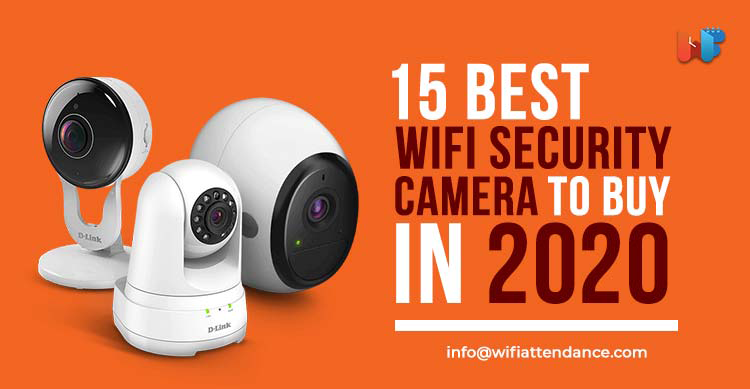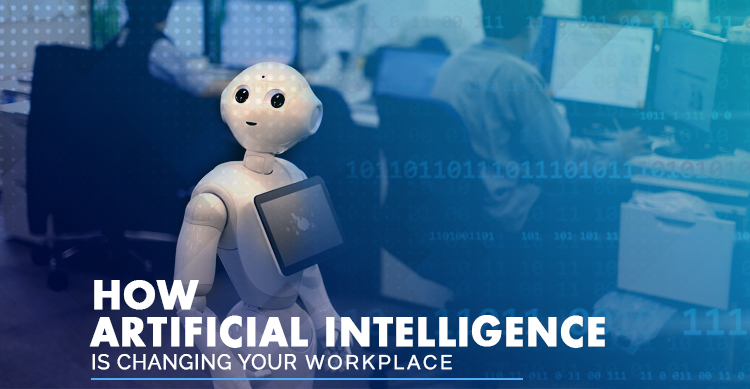
AI or Artificial Intelligence is a buzzword we hear everywhere along with words such as big data, internet of things and virtual reality. By June 2017, Amazon had sold more than 16.1 million Amazon Echos, Amazon’s AI powered speaker device.
You have already encountered AI in your life if you use Facebook or surf Amazon. Facebook Messenger itself has more than 100,000 chatbots that brands are using reach its 900 million users.
AI is also set to make its way from personal lives to workplace too. It’s just a matter of time before our offices are penetrated with various AI technologies.
In fact, a survey by Deloitte found that 41% of respondents have fully implemented or made significant progress in adopting AI technologies in the workforce. Yet only 15% of the 10,000 HR surveyed said they are prepared to manage a workforce “with people, robots, and AI working side by side.”
Many are apprehensive about the introduction of AI in workplaces. Some concerns are understandable whereas others are just a result of ignorance about the technology. Here are some myths about AI that give it a bad name.
Myths about AI
- AI will cause mass unemployment

One of the biggest worries is that AI will replace humans to cause mass unemployment. Celebrities like Elon Musk have publicly voiced their concern over AI replacing human-force.
Sure AI will replace many jobs. What humans take days to do, AI can do in a matter of few hours. However this doesn’t mean that humans will be jobless. A report by Gartner said that AI will eliminate 1.8 million jobs but also create 2.3 million new jobs by 2020.
Just like replacing floor workers with machines during industrialization did not cause mass unemployment, AI will actually create more jobs. AI will take over the mundane and transactional work and leaving us to concentrate on ‘human worthy tasks’.
They will be like assistants that manage your meetings, prepares your reports, and send out your mails so that you can concentrate on coming up with new solutions and strategy to tackle problems. Besides we can look forward to having more jobs in machine learning, data analytics, cyber security, etc.
- AI , Machine Learning and Data Mining are the same
All of these terms are related and it can get confusing for a layman. Artificial Intelligence is the ability of machines to understand mined data to take a decision that is considered smart by human standards.
Machine learning (ML) goes a step further and learns how to learn from data. ML is the vehicle that is driving AI and they work hand in hand to come up with solutions that sometimes smarter than a human.
- AI Apocalypse is imminent
Many people also fear that AI will become so smart that it will take over the world. While we cannot rule out the likelihood absolutely there is no evidence to suggest that this will happen for sure. As with any other technology it is the human user who determines whether the technology is beneficial or threatening to humanity.
Take the case of nuclear power. It is possible to use it as a clean energy source or for destruction of communities. AI apocalypse is just a thought experiment at best right now.
Whether we are free from these myths or not AI technology is growing at an accelerated rate today. Business leaders have understood that they have to embrace AI if they want to remain competitive in the market.
Consider the following stats to know what’s on business leaders mind when it comes to AI:
- Business leaders identify AI as fundamental to company success in future and 72% of them said AI is a business advantage (PwC)
- 47% of digitally mature organizations said that they have a defined AI strategy. (Adobe)
- Consumers are not aware of the extent of AI penetration in their day to day lives. Only 33% percent said they used AI technology whereas the actual usage of AI powered service and device was 77% (Pega)
- 31% of enterprises said that AI is on their agenda for the next twelve months. (Adobe)
- 80% of executives believe that AI boosts productivity (The Motley Fool)
With AI market predicted to cross $5 billion by 2020, there is going to be tremendous change in the way we work, hire and do business at workplace. Let us look at the AI powered enterprise solutions market.
AI Powered Enterprise Applications Market
AI market is an exciting place to be today. It is a dynamic market with big names, new age Silicon Valley start ups and niche boutique companies all competing with each other.
According to Markets & Markets, Enterprise AI Market was valued at $845 million in 2017 and is set to grow to $6 billion by 2022. Application of AI in security, marketing, customer support, HR & Recruitment and process automation are expected to drive a growth rate of 48%.
Some of the big names in the industry are IBM, Amazon, Google, Microsoft, Intel, Iris AI and Apple. All of these big players are investing heavily in the technology and acquiring promising start ups in the AI space.
Google is on a shopping spree for AI start ups and has acquired 12 AI start-ups in four years including DeepMind. Similarly, IBM and Apple have acquired three and four start-ups respectively.
A wave of AI start-ups working on niche AI solutions is emerging in Silicon Valley and across the globe. According to The New York Times there are 45 AI start-ups working on chips alone.
Companies showing potential are quickly acquired. According to CB Insights, 115 of 120 AI companies that exited the market in 2017 did so by acquisition.
So if you are looking for AI powered solution for your company, prepare to be overwhelmed by the number of vendors. There are a lot of questions that will crop up when you are searching for your AI partner. Here are some tips to make your search easier.
Tips to Choose the Right AI Enterprise Solution
> Be prepared for AI– AI is not a software that you can install and forget about. Introducing AI is a big change and your teams need to be prepared for it.
First of all, you need enough big data for AI investment to pay off. You also need staff skilled in AI and data for day to day operations. If collaborative teams are new to your company then you will also need to make changes in company hierarchy (this is discussed below in AI in HR section).
In short AI is an investment of time, effort, money and data and complete commitment from top management is essential in its implementation.
> Big vendor vs. Small start up– Both the options have their pros and cons. Big players are usually known for generic solutions that can work in all industries whereas small start ups specialize in industry (healthcare, education, manufacturing) or functionality (like HR, marketing, operations, etc.,).
Accordingly, some company want to avoid dealing with multiple small vendors and pick big players whereas others go for tailor-made solutions offered by small companies.
> Data Sensitivity – Choice of vendor will also depend on whether you are willing to share your data externally or not. Many big players offer MLaaS (Machine Learning as Service) and cloud computing option. If you are not comfortable sharing data then on premise solution would be a suitable option.
> Vendor Support – As mentioned AI implementation is a long term project. You must choose a vendor willing to offer great after sales support in terms of training your staff, handling roadblocks and managing change in your organization.
> Cost– Lastly cost will also be a major consideration especially in this market where the big players can bill you exorbitantly high. Fortunately small start-ups are coming with competitive pricing and driving the prices down.
This was the overview of the market on the whole. Let us now look at how AI is powering each of the functionality with our workplace.
Artificial Intelligence in HR
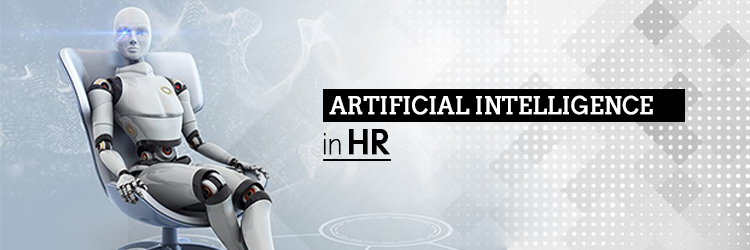
Imagine your surprise when you come to know that the HR you interacted with during your hiring process was actually an Artificially Intelligent agent. Yes, AI is taking over from the HR when it comes to hiring, recruiting, training and employee engagement.
For example, Textio uses augmented writing (application of AI on writing) to give HRs a fitting job description to attract right talent. It does this my analyzing data on similar job postings and the kind of candidates it attracted. Companies such as Apple and Twitter are using the technology to attract the best in class employees.
Another software, Veriato, analyses employee mails and messages for words that reflect employee emotions and feelings. It then scores each employee on positive and negative sentiments. This score can have application in measuring employee engagement, productivity or detecting company fraud and cyber attacks.
Similarly there are specialized software for HR processes like MontageTalent for interviewing, Talla for on-boarding and growBot for social recognition.
Changing HR Structure to accommodate AI colleagues
The Deloitte survey found that 56% of respondents are already redesigning their HR programs to leverage digital and mobile tools, and 33% are utilizing some form of AI technology to deliver HR functions.
Getting AI on board is more than just installing software. Successful integration will require a complete overhaul of who is hired and how we are related to each other in a company.
Who should be hired?
To start with AI will need a differently skilled taskforce that is adaptable and embraces change. This means that hiring by seniority and experience will give way to hiring by cultural fit and skills.
The question of who should I hire will likely change to what should I hire? A human , AI or a AI powered employee? In such a case ease of working with AI and complementing your skill with technology will be the desired quality.
How should the structure be?
The hierarchical structure of the company itself has to change to make the most of AI empowered tools. AI thrives on cross functional data which call for teams coming together to solve problems.
Also since AI has application on all functions all departments must work collaboratively with IT, data analytics and Artificial Intelligence.
You can also expect to see new roles in an organization as AI makes some redundant. For there is no need of an HR admin as AI takes care of all the mundane tasks and query handling. Instead you can expect to see roles like employee experience manager or AI skills trainer.
AI vs HR
AI will impact the employers before it impacts the employees. HR may be weary of the change and wonder if they are competing with AI for their jobs.
As stated above, implementation of AI will give birth to more job roles better suited for human. Change is inevitable and anyone unwilling to learn new skill sets should be worried. Therefore it is not really AI vs. HR but – AI with HR.
AI will also take on the mundane parts of a job that we hate doing anyway. Juergen Mueller, SAP’s chief innovation officer says “Recruiters spend 60% of their time reading CVs. Why should a person read 300 resumes if a machine can propose the top ten?”
Human qualities of empathy, creativity and inter-disciplinary skills will be much valued and irreplaceable by any bot.
Artificial Intelligence in Marketing
Application of AI on marketing and sales seems most exciting as it has a direct relation to the company’s bottom line. AI promises to bring back what was lost in mass marketing- an intimate relation with the customer.
AI can help in all stages of conversion funnel that is awareness, lead generation and conversion. You can imagine AI tools qualifying leads based on demographics, browsing history and financial data of lead. This will free your sales agents from calling each lead and rather give them high quality leads.

Jaywing uses AI and data analytics to come up with innovative marketing campaigns for their clients such as Pepsi and Sky. For example, they used digital tracking system for Swinton Insurance to track online and offline customer interactions on multiple channels.
Using AI they can separate each customer journey from the rest, enabling brands to measure marketing ROI per person.
AI in E-commerce is another exciting area currently being explored by the likes of Amazon, Flowers.com and North Face. The Guardian reports that 59% of U.K. fashion retailers use some form of facial recognition.
Check out Domino’s Robotic Unit that delivers Pizza overcoming many obstacles just like a human.
AI technology also allows a one on one website personalization possible today. With data on each visitor a tailor-made website can be shown to each visitor. This one on one marketing strategy is not yet widespread though. According to the Trends in Personalization survey, algorithmic personalization and machine learning are used by just 20% of organizations surveyed.
Artificial Intelligence and Customer Support
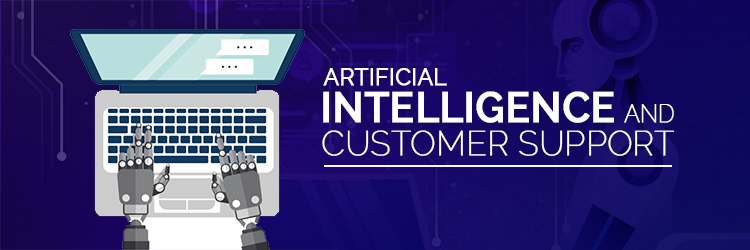
Business leaders know that it is the customer experience that will set market leaders apart from the rest in future. Fortunately there is a lot that AI can do in this space where customers are largely dissatisfied. According to Kampyle, 87% of customers say brands need to put more effort into providing seamless experience across all channels.
Customers have multiple channel of communication available today. They may send a mail, contact on app or have chat on your website. AI technologies that can identify customers across all these channels are much in demand. This will reduce customer frustration and resolution time.
It makes sense to invest in existing customers considering the fact that new customer acquisition costs five times more than existing customer retention. Technology that provides seamless experience and assists support agents with meaningful data can make or break customer experience.
Data analytics has already changed customer’s expectation from support agents.
- Customers want immediate resolution. NO matter the time of night or time zone of the customer, today’s customer is impatient and want quick solutions. AI can help by handling low complexity issues.
- Human Touch for high stake issues- Customers prefer self-help for low impact issues but want a knowledgeable human agent for high stake issues. This means highly skilled staff with knowledge of customer background is the standard expected. There are already suites of AI powered software available that assist agents in real time to give a smooth customer experience.
- Low tolerance on errors- Customers have plenty of options to shift to if they are not satisfied. AI can monitor post resolution behaviour and highlight customers at risk of abandoning businesses.
There are already AI solutions that address the all the above issues and are transforming customer experience successfully. IBM’s Watson is offering customer personality insights, tone analyzer and real time assistance to client support agents.
AI and Project Management
AI project management is a system that can run or administer a project without need for human input. This means processes like scheduling, work allocation, budgeting, performance tracking, etc., can be taken care by artificially intelligent systems.
Current generation of project management systems is already doing parts of project with the help of data inputs in project management tools. For example, Stratejos, an assistant for project teams, works on estimates, budgets and sprint management.
As AI technology advances systems will be able to provide wider project assistance. They will keep a track of tasks in a way which is not humanly possible. This data can be used for performance evaluation and workload distribution that is fair and even.
These are some of the functions where AI has already made its way in the workplace. There is no function which will remain untouched by AI. Many tasks in finance, sales, manufacturing, training and more can benefit from assistance by AI powered tools.
So where are we on the AI Journey today?
The idea of machines with human capabilities is not new. Ideas about machines with ability to think can be found in ancient Greek mythological beings such as Talos and Galatea. Aristotle is said to have described a formal and mechanical way to thinking back in 320 BC.
The invention of computers turned philosophy into reality in the nineteenth century. In 1950 Alan Turing devised the Turing Test – a test for machines to convince humans that they are humans. He predicted that artificial intelligence will be able to pass the test in 2000.
Fast forward 68 years and we are nowhere close to a machine that can convince us it is human. To understand this it is important to distinguish between two broad categories of AI:
1) Narrow AI – this is AI that focuses on narrow set of activities. It can surpass human abilities on specific tasks but cannot do any tasks outside it. An example could be Alexa shopping for you on Amazon but not able to play chess with you.
2) General AI – This is AI that can juggle between tasks like humans and understand different contexts. AI is far behind in this category and a human like intelligence essentially means that AI has to catch up here.
The trouble with achieving human like AI is that it is difficult to define ‘human intelligence’. We need to be able to understand how humans think, retrieve memory, weigh options and make decisions for this. And we are not even touching the multi-layered human mind and nature of consciousness here.
As for now it looks like AI is good for specialized tasks only and it will be many years before it can pass the Turing Test.
Future of AI
Ever increasing amount of Big Data and Machine Learning means that machines will progress fast in narrow AI. There expanding facets of life where AI will enter including our workplace.
But it is difficult to forecast when AI will progress in General AI and reach human like abilities. Once they can do this there is no turning back, as they can teach themselves to evolve into super-intelligent beings pretty quickly.
However, this could be 50 years or more years from now. We cannot know because we do not still understand what it means to be a ‘conscious human’ in the first place. Furthermore, there are many possible events like breakthrough in cognitive neuro-science, societal collapse, quantum computing, etc.,that could accelerate or decelerate this journey.
Challenges in AI Journey
It would be realistic to expect challenges in adopting AI at workplace. Here are some concerns that employees are voicing in anticipation.
Privacy
Many of the HR & Recruitment AI solutions discussed above promise to keep an eye on every employee on behalf of the HR. Although the intention is to increase productivity, not everyone is comfortable with AI taking screenshots of their desktops every hour.
These software track employee location, browsing patterns and sift through all their mails and messages to measure productivity and emotional states. This is very private information and people fear misuse and manipulation as a result of this.
Data theft incidents are common news today and companies like Uber and MyFitnessPal have been prey to hackers. This is not helping in soothing fears on privacy.
Data Misuse
Facebook’s misuse of 50 million data in Cambridge Analytica case has fueled the data misuse issue. Many have gone to extent of deleting their account fearing misuse of their whole story life which is available on Facebook. Usually companies keep a detailed account of their employees from work history to financial information.
Misuse by third parties, attacks by malicious persons or intentional/ unintentional breach by the company itself are all real possibilities. Companies must address these potential hazards before they bring AI onboard. A written AI and Data Policy must be in place to secure employees.
Lack of Human Touch
Is my boss going to be an Artificially Intelligent software? This is obviously an unsettling question. The idea of taking orders from a software may not go well with all. And this is a real possibility with AI powered solution for project management that distribute work for maximum efficiency.
Making friends and building lasting relationships is a big part of employee engagement and workplace satisfaction. Without sufficient human interaction the workplace will turn to a solitary confinement devoid of human touch.
Loss of Job
This is the biggest fear that is being hyped everywhere. It is true that AI will take over many jobs. However, people forget that it is also going to create more jobs. Employees must be educated on the change that is going to come since most of the fear is due to lack of knowledge.
It must be made clear which tasks are going to be performed by AI and which ones by humans. New job responsibilities and expectations must be shared with employees to avoid confusion. In any case taking over of tasks by AI is a big change and successful change management will be required for it to succeed.
Apart from employees companies also have to address many other points.
Integration
How will the new technology integrate with your current software? This is a question that must be addressed at the time of vendor selection.
Changing the whole CMS system to integrate AI support system is a big problem. This will involve data migration, additional cost and changing workflow for sales and marketing.
ROI
Since it is still early in AI solutions market it is not clear which solutions are actually worth the cost and which are not. Does HR need AI to capture location of the employee in IT industry?
And what is the benefit of it? As more AI companies enter the market, companies may be overwhelmed with AI features with no data on profitability to fall back on. Measuring Return on Investment for AI technology is going to be a challenge at least for the initial few years.
Ethics
AI is going to make leaders take tough decisions. With more power comes more responsibility and AI will give tremendous power in business leader’s hands. By allowing micro – monitoring and measuring parameters that were earlier not measurable it will give lot of actionable data to leaders. Some of the questions they may be faced with are:
- Should keep and re-purpose a redundant workforce or let them go?
- Should I collect personal information to better workplace productivity?
- Should I trust my team’s experience and intuition or take action on AI’s suggested strategy?
- Should I reveal the full extent of AI data monitoring to my employees?
These are tough questions to answer for someone who is accountable for company’s profitability. Only companies with strong ethical culture will be able to maintain transparency and employee trust.
Tying It All Together
From a philosophical thought to mainstream commercial use, AI has come a long way. However, the technology is still primitive compared to what it can become. Misconceptions and fears are many for AI technology which is not understood fully by the common man.
Business leaders know that embracing AI is their only option if they have to survive in the future. The challenge is to address employee apprehension and build a team of AI and humans that works with each other.
To do this leaders must address fears regarding job loss, AI as bosses, reducing decision making power, data privacy and business ethics.
Once employees understand that AI is here not to take their job but to enhance it, the possibilities in workplace productivity are endless. AI powered solutions are already on the offering for HR, Marketing, Operations, Customer Support and Project Management.
The market for these solutions is new and exciting with big players and boutique start-ups offering cutting -edge solutions for businesses in all industries.
It’s still early for AI in workplace though and the challenges for its adoption are many. Early adopter of AI technology must risk ROI and take a firm stand on ethics while they manage change in their company. However the competitive advantages of adopting AI early on are worth the risk and the cost.
We do not know when AI will surpass human intelligence as a whole but as far as performing in narrow tasks is concerned; AI is already ahead of us. The future of AI with humans in workplace will bring in a new era that we can only wait for with fascination and excitement.


